
CATALYSIS LETTERS
Scope & Guideline
Illuminating the Path of Catalytic Innovation
Introduction
Aims and Scopes
- Catalyst Design and Development:
Research on novel catalysts, including metal, metal oxide, and hybrid materials, aimed at improving catalytic performance for various chemical reactions. - Mechanistic Studies:
Investigations into the mechanisms of catalytic reactions, including the role of active sites, reaction pathways, and kinetics. - Environmental Catalysis:
Studies focused on the development of catalysts for environmental applications, such as the degradation of pollutants and CO2 reduction. - Biocatalysis and Green Chemistry:
Exploration of enzyme-based catalysts and sustainable processes for organic transformations. - Nanocatalysts and Nanostructured Materials:
Research on catalysts at the nanoscale, including their synthesis, characterization, and enhanced catalytic properties due to unique structural features. - Photocatalysis and Electrocatalysis:
Studies on catalysts that utilize light or electrical energy to drive chemical reactions, with applications in renewable energy and environmental remediation.
Trending and Emerging
- Sustainable and Green Catalysis:
An increasing number of studies focus on environmentally friendly catalytic processes, including the use of biomass-derived catalysts and recyclable materials. - Photocatalytic Applications:
There is a notable rise in research related to photocatalysis, particularly for hydrogen production and organic pollutant degradation, driven by renewable energy interests. - Electrocatalysis for Energy Conversion:
Emerging research on electrocatalysts for energy conversion processes, such as hydrogen evolution and CO2 reduction, reflecting global energy sustainability goals. - Nanostructured Catalysts:
A growing emphasis on nanostructured catalysts, which leverage unique properties at the nanoscale to enhance catalytic performance and selectivity. - Biocatalysis and Enzyme Engineering:
An upward trend in the utilization of biocatalysts, particularly in green chemistry applications and enzyme immobilization techniques, indicating a shift towards biotechnological approaches.
Declining or Waning
- Traditional Catalytic Processes:
Research on classical catalytic processes, such as homogeneous catalysis, appears to be waning as interest shifts towards heterogeneous and more sustainable catalytic systems. - Conventional Transition Metal Catalysts:
The focus on traditional transition metal catalysts is decreasing, potentially due to the increasing interest in non-noble metal and environmentally benign catalytic alternatives. - Single-use Catalysts:
There is a noticeable decline in studies dedicated to catalysts that are not easily recoverable or reusable, as the field moves towards sustainability and recycling in catalytic applications.
Similar Journals
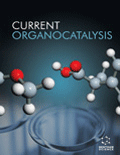
Current Organocatalysis
Unveiling Innovations in Organocatalytic ResearchCurrent Organocatalysis is a premier academic journal dedicated to the dynamic field of organocatalysis, published by Bentham Science Publishers, Ltd. Based in the United Arab Emirates, this journal has been a valuable resource for researchers since its inception in 2014 and will continue to publish impactful articles until 2024. The journal provides a platform for sharing groundbreaking research, reviews, and insights that significantly contribute to the fields of Analytical Chemistry, Catalysis, and Organic Chemistry. With a Q4 ranking in several chemistry categories, it identifies and disseminates emerging strategies and methodologies in organocatalysis, promoting collaboration and advancement in the community. While it operates on a subscription basis, the journal ensures accessible content for its audience to further supplement academic learning and professional development. Researchers, professionals, and students are encouraged to explore and contribute to this critical field, leveraging the journal as an essential resource for the latest trends and innovations in organocatalysis.

Green Synthesis and Catalysis
Innovating Tomorrow's Chemistry TodayGreen Synthesis and Catalysis is a pioneering Open Access journal dedicated to advancing the fields of biotechnology and catalysis, published by KEAI PUBLISHING LTD since 2020. With an impressive Q1 ranking in both Biotechnology and Catalysis and notable Scopus rankings placing it in the top echelons of its categories, this journal serves as a critical platform for researchers and professionals dedicated to innovative and sustainable chemical practices. The journal addresses the pressing need for environmentally-friendly synthesis methods and efficient catalytic processes that align with global sustainability goals. Based in Beijing, China, it offers a wealth of peer-reviewed articles, reviews, and cutting-edge research focusing on green technologies and practices. Academics and practitioners alike can benefit from the journal's wide-ranging scope that promises to push the boundaries of current scientific understanding and application. Engage with the latest discoveries by accessing the journal’s enriching content online, and contribute to the transformative dialogue surrounding sustainable synthesis and catalytic innovation.

Catalysis in Industry
Unleashing the potential of catalysis in industry.Catalysis in Industry, published by MAIK NAUKA-INTERPERIODICA, is a pivotal journal in the field of chemical engineering and catalysis. With its ISSN 2070-0504 and E-ISSN 2070-0555, this journal has been dedicated to advancing the understanding and application of catalytic processes in industrial settings since its inception in 2010. Despite its Q4 ranking in the category of Catalysis as of 2023 and a Scopus rank of #61/68, the journal serves as a valuable platform for researchers and practitioners to disseminate innovative ideas and findings that contribute to the evolution of catalysis technology. Published in Russia, Catalysis in Industry aims to bridge the gap between academic research and industrial practice, providing Open Access options to facilitate widespread accessibility and encourage a collaborative approach to chemical engineering challenges. As the industry grapples with the demand for sustainable solutions and efficient processes, this journal remains a critical resource for the academic community, aspiring professionals, and students eager to deepen their knowledge in catalytic applications.
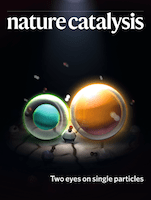
Nature Catalysis
Unleashing the Power of Catalysis in Modern ScienceNature Catalysis is a premier academic journal published by NATURE PORTFOLIO, specializing in the rapidly evolving fields of biochemistry, bioengineering, and catalysis. With its ISSN of 2520-1158, this journal has emerged as an invaluable resource since its inception in 2018, contributing significantly to interdisciplinary research. Recognized for its high impact within the scientific community, it holds a prestigious Q1 ranking across multiple categories, including Biochemistry, Process Chemistry and Technology, and Catalysis as of 2023, illustrating its influence and authority in the field. Researchers will find impactful articles characterized by rigorous peer review processes that push the boundaries of knowledge in catalysis and its applications. While the journal operates with traditional access models, it remains accessible to a global audience interested in innovative research findings that promise to shape future developments in these critical areas. Positioned at the forefront of contemporary scientific inquiry, Nature Catalysis invites contributions that expand upon catalytic processes and technologies, which are crucial for advancing both fundamental science and applied engineering.

Chem Catalysis
Fostering collaboration for transformative chemical solutions.Chem Catalysis is a leading academic journal published by CELL PRESS, specializing in the diverse and dynamic field of chemistry. Since its inception in 2021, this open-access journal has rapidly ascended to prominence, holding Q1 quartile rankings in prestigious categories including Chemistry (Miscellaneous), Organic Chemistry, and Physical and Theoretical Chemistry. With its Scopus rankings placing it in the top tiers—Rank #14 in Organic Chemistry and Rank #12 in Miscellaneous Chemistry—Chem Catalysis serves as a vital platform for disseminating innovative research and catalysis science. Researchers and professionals seeking to stay abreast of cutting-edge developments will find this journal indispensable for advancing their knowledge and contributions to the field. Located in Cambridge, Massachusetts, Chem Catalysis is committed to fostering collaboration and innovation in the chemical sciences, paving the way for breakthroughs that address global challenges.
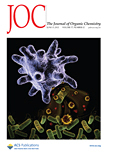
JOURNAL OF ORGANIC CHEMISTRY
Pioneering Discoveries in Organic Chemistry Since 1936Journal of Organic Chemistry, published by the American Chemical Society, is a prestigious peer-reviewed journal dedicated to advancing the field of organic chemistry. With an ISSN of 0022-3263 and an E-ISSN of 1520-6904, this journal has established itself as a key platform for disseminating high-quality research since its inception in 1936. Residing in the Q2 category for Organic Chemistry as of 2023, it ranks #64 out of 211 in Scopus, positioning itself within the top 69th percentile of its field. Researchers and professionals can access vital findings and innovative methodologies that drive the understanding and application of organic chemical principles. Although the journal is not open access, it remains a crucial resource in academia and industry, contributing significantly to the scientific community's knowledge base. For detailed insights and cutting-edge research, the journal continues to be an essential read for those engaged in the dynamic and evolving landscape of organic chemistry.
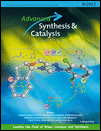
ADVANCED SYNTHESIS & CATALYSIS
Unleashing potential through cutting-edge methodologies.ADVANCED SYNTHESIS & CATALYSIS is a prestigious academic journal published by Wiley-VCH Verlag GmbH, based in Germany. This journal, with ISSN 1615-4150 and E-ISSN 1615-4169, plays a pivotal role in the fields of Chemistry and Chemical Engineering, earning commendable rankings such as Q2 in Catalysis and Q1 in Organic Chemistry in 2023. Its high impact factor and recognition—ranking #18 in both Organic Chemistry and Catalysis—further underscore its significance as a platform for groundbreaking research and innovative methodologies. Spanning from 1996 through 2024, ADVANCED SYNTHESIS & CATALYSIS aims to disseminate high-quality, cutting-edge studies related to synthetic processes and catalytic technologies, ensuring accessibility via their open access options. By fostering a vibrant scholarly community, this journal serves as an essential resource for researchers, professionals, and students dedicated to driving advancements in synthetic and catalytic chemistry.

KINETICS AND CATALYSIS
Empowering Researchers in Chemical KineticsKinetics and Catalysis is a pioneering journal dedicated to advancing the field of catalytic science and chemical kinetics, published by Pleiades Publishing Inc. Based in the Russian Federation, this journal serves as a critical platform for disseminating high-quality research related to the mechanisms of chemical reactions and innovative catalytic processes. Although currently not an open access journal, it maintains academic rigor through a comprehensive peer-review process that ensures the relevance and integrity of its published works. With a history dating back to 1968, Kinetics and Catalysis has evolved through various converged years, reflecting its commitment to interdisciplinary research within the realms of chemistry, catalysis, and the computational aspects of modeling and simulation. As evidenced by its Scopus rankings and quartiles, it stands as an influential, albeit niche, journal, appealing to researchers, professionals, and students eager to explore the intricacies of chemical transformations. The journal’s robust archive offers an invaluable resource for those seeking to expand their understanding of both theoretical and practical approaches to catalysis.
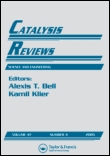
CATALYSIS REVIEWS-SCIENCE AND ENGINEERING
Navigating the Frontiers of Catalytic ScienceCATALYSIS REVIEWS - SCIENCE AND ENGINEERING, published by Taylor & Francis Inc, is a leading journal in the field of catalysis, providing a vital platform for the dissemination of rigorous research and comprehensive reviews from 1968 to the present. With an impressive Q1 ranking in multiple categories, including Catalysis and Chemistry, this journal stands out as an essential resource for professionals, researchers, and students alike. Its high impact factor and esteemed Scopus ranks — including 3rd in Chemical Engineering: Process Chemistry and Technology — highlight the journal's influence and prestige within the scientific community. While primarily a subscription-based publication, the journal’s commitment to advancing the understanding of catalytic processes continues to foster innovation in various industrial applications, making it indispensable for anyone engaged in the fields of chemical engineering and applied chemistry.
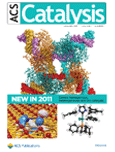
ACS Catalysis
Pioneering Research for Tomorrow's Catalytic ChallengesACS Catalysis, published by the American Chemical Society, stands as a premier journal in the field of catalysis, offering a vital platform for researchers, professionals, and students focused on advancing the science of catalysis and its applications. With an impressive impact factor placing it in the Q1 category for both Catalysis and Chemistry (miscellaneous), this journal has established itself as a leading source of high-quality research findings, currently ranking #21 out of 408 in General Chemistry and #9 out of 68 in Catalysis according to Scopus. Since its inception in 2011, ACS Catalysis has aimed to publish innovative research that addresses the critical challenges in catalytic processes, advancing our understanding of both fundamental and applied aspects of catalysis. With a commitment to promoting open scientific discourse, it serves a vital role for those interested in the latest methodologies, discoveries, and trends in this essential discipline. Based in Washington, DC, ACS Catalysis continues to uphold the highest standards of scholarship and collaboration within the vibrant community of chemists and engineers worldwide.